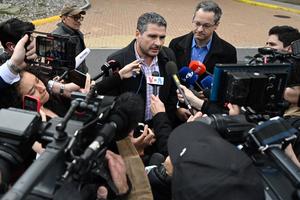Rep. Chris Smith Advocates Love and Courage in the Fight for Life
Longtime Lawmaker Is Staunch Ally for the Unborn

Catholic Rep. Chris Smith, R-N.J., has worked in the pro-life movement for almost half a century, accomplishing much of that work in Congress by fighting for legislative protections for the unborn. Ahead of the 46th-annual March for Life, Smith talked with the Register about the pro-life successes and setbacks he has faced and how he sees the movement as one that is grounded in courage and love. The desire to prioritize the fight for the unborn came for Smith in college just a year before the Roe v. Wade Supreme Court decision that legalized abortion nationwide in 1973. While preparing for a public-speaking class on the issue, he was struck with how one of the parties involved was being seriously overlooked.
Smith recalled reading an article about an abortion “where the child survived and the abortionist was complaining about this. He didn’t call it a complication, but that’s basically what he said, and I kept thinking, ‘Well, where are that child’s civil rights?’”
That thought remained with him, and he became immersed in pro-life work, met his wife in the movement, and became the executive director of the New Jersey Right to Life Committee. He was elected to Congress in 1981 and has prioritized pro-life issues throughout his time there.
When asked to pinpoint the most crucial pieces of pro-life legislation he has worked on, he replied “all of it” because “every initiative is designed to save women and children who are at risk of the violence of abortion.” Smith argued that pro-life legislative efforts have literally saved lives.
He cited the Hyde Amendment and other appropriations riders, passed annually, which help ensure that taxpayer money is not spent on abortion.
“When we do these funding bans, they save lives, and the empirical data proves it,” he said.
A 2016 study by the Charlotte Lozier Institute found that the Hyde Amendment had saved 2 million lives since it was first passed in 1976.
“If the money’s not there to facilitate the chemical poisoning or dismemberment of an unborn child, there are a sizable amount of women who opt not to have the abortion,” Smith said.
Lifesaving Efforts
As pro-abortion Democrats take over the House this month, Smith cautioned that these bans on taxpayer funding for abortion are “at risk this year as never before.” He pointed to the need for his No Taxpayer Funding for Abortion Act, which “would make all the pro-life riders like the Hyde Amendment permanent so we don’t have to redo them every year.”
Smith also argued that legislation such as the Pain-Capable Unborn Child Protection Act, which bans abortion after 20 weeks, would save many lives by lowering the gestational age at which abortion is legal.
“If we could get that passed in the Senate — it’s passed the House a number of times — it would make all the difference in the world for a sizable number of children,” he said, “if we could move them to a lower gestational period that would save even more children.”
Smith went on to emphasize the life-saving impact of pro-life groups pushing parental notification and information laws in their states.
“Because of the magnificent work of the pro-life movement at the state level, hundreds of laws have been passed,” he noted, “women’s right-to-know laws, laws that require waiting periods, and laws that require parental notification or consent, which can be proven empirically to save many children from the violence of abortion.”
Attending and speaking at the March for Life is an annual tradition for Smith, who called it “one of the best expressions and witnesses for life in the world.” In a statement to the Register, March for Life President Jeanne Mancini referred to Smith as “the New Jersey champion who has been a fighter for the voiceless and the oppressed his entire life.”
“If more members were like Rep. Smith, putting principle above his own personal gain, we would likely still have a pro-life majority in the House,” she added. “As we face the most pro-abortion House in history, we need pro-life warriors in Congress.”
Smith praised the theme of this year’s March for Life — that “Pro-Life Is Pro-Science” — and pointed to advanced ultrasound technology as confirming what the scientific community has known for decades: that the unborn child is a living human.
“First baby pictures are always the child in the womb, the ultrasound pictures,” he said. “There are all the first baby pictures, shattering the myth that somehow the child is not human and alive.”
This realization of the unborn child’s humanity, though it’s becoming more advanced with 3-D ultrasounds, is not a new one. Smith gave the example of the dramatic conversion of Dr. Bernard Nathanson, a former abortionist and founder of the abortion advocacy group NARAL.
Part of what caused Nathanson to change his mind back in the 1970s, Smith said, was witnessing prenatal surgery on the unborn child. It got to the point where Nathanson wondered: “How can we be dismembering that patient in one room and calling it benign and compassionate while we’re in the other room trying to save that child’s life with every means possible?”
While science continues to show the humanity of the unborn child, Smith emphasized the importance of having courage and showing love to both mother and child when advancing the pro-life cause. He received death threats this past year and has had to deal with harassment over his stance on abortion. His response is to remind himself who he’s fighting for and draw strength from Scripture. He quoted Proverbs 3:5-6: “Trust in the Lord with all your heart, and lean not on your own understanding.”
“The key is trust, acknowledging God,” he emphasized. He said he takes seriously the Gospel admonishment to care for “the least of my brethren,” arguing that “the unborn child is the least of our brethren; the mother in a crisis pregnancy is the least, in the sense of vulnerability. She is being hurt because of her vulnerability, so that concern crowds out fear, crowds out worry concerning outcomes, even the whole idea of the risk of something more violent.”
Smith also praised the courage of the remaining pro-life Democrats in the House of Representatives who are willing to go against their own party on the issue. He named Reps. Dan Lipinski, D-Ill., Collin Peterson, D-Minn., and Rep. Henry Cuellar, D-Texas, as the last three pro-life Democrats in the House.
“They all pay a price for it politically,” he said, “but they’re very courageous men.”
“There are many, many members that used to be pro-life on the Democrat side; they, unfortunately, abandoned those core convictions, and that’s tragic,” he added, “and they knew it — they knew why they were pro-life because, obviously, there’s a child’s life that will be snuffed out.”
Rep. Lipinski, who co-chairs the bipartisan Pro-Life Caucus with Smith, spoke highly of his colleague’s unwavering courage.
He told the Register that Smith “has not only been the strongest voice for more than two decades protecting life in Congress, he has been a force at the U.N. and elsewhere. He is untiring and unwavering in the protection of human rights around the world.”
Smith’s passion for fighting abortion worldwide is apparent. He praised the Trump administration’s reinstatement and expansion of the Mexico City Policy, which prevents federal money from going to abortion overseas.
He also emphasized the importance of not funding “any organization that is associated with, supports or co-manages a program of coercive population control, i.e., China, and other places where coercion is rising, leading to sex-selective abortions.”
He noted that 62 million girls are “missing” as a result of China’s forced-abortion policy. “We don’t give money to the U.N. Population Fund because of their inhumane complicity with that program,” he said. “Trump stopped it; Obama paid for it.”
‘All About Love’
Amid the challenges of pro-life work, Smith said it’s important to take seriously the admonishment to love one’s enemy. “That’s the hardest one of all, I think,” he said, “to pray even for the abortionists, the way 40 Days for Life and all these different great ministries do.”
“This movement is all about love, reconciliation, care and compassion — and what an inspiration that is,” he reflected. He and his wife participate in a ministry to post-abortive women, and he called these women “the face of God’s incredible love.”
He praised their ability to move forward and “speak out so eloquently that they reach other women, and they’re able to give the lie to all of the falsehoods and deceptions that are out there, all the sloganeering by the other side.”
Reflecting on his decades of pro-life work, he said that something stood out to him about the people in this movement.
“The pro-life people I have found — I mean, I’ve been in it for 46 years, worked at it in every level, from pregnancy-care centers to right-to-life organizations — they’re the most selfless, generous people I have ever met,” he said. “They just [do so] quietly, without any fanfare; that’s where the selflessness comes in: just trying to save the most innocent among us from a certain death in an abortion.”
Smith has hope that the courage and love of the pro-life movement will prevail, whether due to legislative efforts, scientific advancements or a cultural shift.
“Future generations of Americans will look back and wonder how a country that prided itself on civil rights … could have been involved with 60 million dead babies,” he said. “I’m amazed myself that so many people that I respect, work with, have a blind spot when it comes to the innocent and ‘inconvenient’ unborn child.”
“I think that someday will change,” he concluded, “but we’ll look back and say: How could we?”
Lauretta Brown writes
from Washington, D.C.
- Keywords:
- lauretta brown
- march for life
- rep. chris smith

















